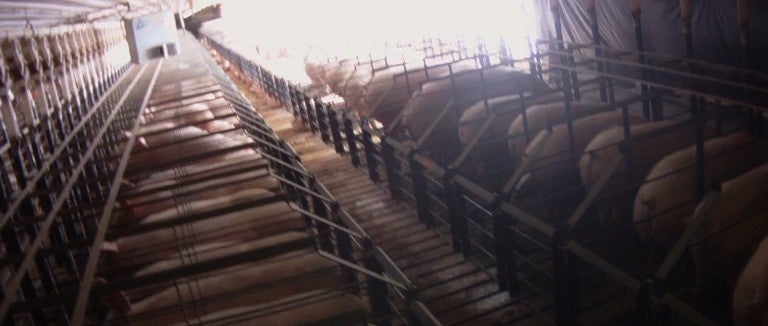The most recent data about land animals bred, kept and slaughtered for consumption has revealed a figure higher than ever before: An estimated 92.2 billion land animals are kept and slaughtered annually in the global food system, according to the Food and Agriculture Organization.
Not only is the scale of animal suffering unfathomable, but for years mounting research has pointed to the food system as a major source of stress on the climate. But it doesn’t have to be this way.
A team from Humane Society International will attend the United Nations Framework on Climate Change conference in Bonn, Germany, this month, to engage with negotiators, high-level officials and key stakeholders to advocate for a transformation of the global food system that we all so desperately need.
There is hope. Shifting to plant-based eating habits can reduce the greenhouse gas emissions of our food system by 49%, reduce food’s land use by 76% and reduce freshwater use by 19%. And it’s heartening to know that everyone can do their part by committing to eat just a few more plant-based meals per week.
Today's unsustainable global food production methods and consumption habits are responsible for about one-third of all human-caused greenhouse gas emissions, and the production of animal-based foods is responsible for 57% of these emissions, nearly double that of plant-based foods. Emissions from the livestock sector account for as great a share of global greenhouse gases as the exhaust emissions from all cars, planes, trains and boats around the world combined.
The existing food system also puts enormous pressure on agricultural land and water. Meat, dairy and aquaculture production systems use the vast majority (83%) of the world’s farmland despite providing just 18% of global calories and 37% of protein. Farmed animal production has also dominated land-use change, pushing crop production and pastures into wild habitats and contributing to an alarming rate of species extinction.
Such a massive problem beckons for a global solution. Around the world, our teams are demonstrating that modest changes in consumption, procurement and spending habits can be implemented successfully at scale to address this growing crisis. For example, Sodexo Canada, one of Canada’s largest food service companies, made a nation-wide commitment to transition 20% of their current protein purchases to plant-based at more than 200 locations across the country. Similar shifts are being implemented in municipalities across Brazil. Since 2022, we have been working together with Mercy for Animals Brazil to secure and implement commitments from Brazilian cities to transition 20% of all meals served in municipal schools to plant-based offerings. These commitments will result in more than 19 million plates going from animal-based to plant-based every year, providing over 280,000 school children with healthy, sustainable meals and sparing more than 640,000 animals from suffering.
Despite compelling scientific evidence, most governments with significant animal agriculture lobbies have been reluctant to consider or implement even the most modest reforms or policies to transform our global food system. That is why we are joining climate advocates and scientists from around the world to advocate for initiatives and policies that support a just transition to a more resilient, plant-centric global food system with concrete action. We need governments to shift public procurement away from animal-based foods to more plant-based foods. We need policies that encourage the plant-based industry; we need to support and incentivize farmers to transition to more sustainable, plant-based agriculture; and we need to foster innovation and growth in developing protein alternatives such as cultivated meat.
We’ll bring this message to Bonn, to the next UN Climate Change Conference (COP28) in Dubai at the end of this year and beyond until governments and other stakeholders adopt meaningful reforms in the global food system. Animals and our planet cannot wait.
Urge world leaders to create a more resilient and more plant-centric food system.
Follow Kitty Block on Twitter @HSUSKittyBlock.



